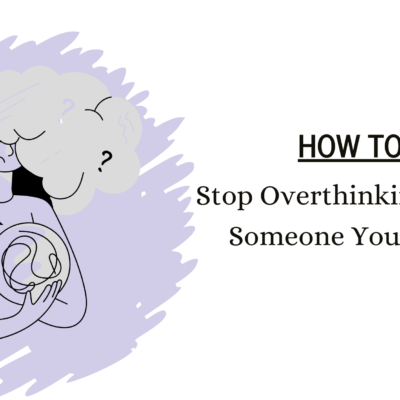How to Stop Overthinking About Someone You Love: Overthinking is a common emotional struggle that many people face, especially when it comes to relationships and matters of the heart. Whether you’re in a new relationship, experiencing an unrequited love, or dealing with the uncertainty of a relationship, overthinking can cloud your judgment, create unnecessary stress, and ultimately prevent you from experiencing peace and happiness. If you’re caught in the loop of overthinking about someone you love, you’re not alone, and it’s possible to break free from this cycle. In this article, we’ll explore effective strategies to help you stop overthinking and regain control over your emotions and thoughts.
Also Read:
What Is Overthinking?
Overthinking involves obsessively analyzing situations, conversations, or feelings. It’s when your mind goes in circles, replaying thoughts and scenarios over and over again without finding a resolution. In the context of love, overthinking can manifest as worrying about how someone feels about you, second-guessing your actions, or imagining worst-case scenarios.
This can create a feeling of being trapped in your mind, preventing you from fully enjoying your relationship and leading to unnecessary anxiety and self-doubt.
Why Do We Overthink About Someone We Love?
There are several reasons why people tend to overthink when it comes to someone they care deeply about:
- Fear of Rejection: One of the most common reasons for overthinking is the fear that the other person might not feel the same way. This can make you overanalyze every interaction and interpret things through the lens of anxiety.
- Insecurity: If you’re insecure about your own worth or the relationship, you may constantly wonder whether you are good enough for the person you love. This insecurity leads to second-guessing and overthinking.
- Past Experiences: Past relationships or experiences with abandonment and betrayal can cause you to become hyper-vigilant in future relationships, always worrying about making the same mistakes.
- Uncertainty and Ambiguity: When the other person is not forthcoming with their feelings or intentions, ambiguity can trigger overthinking. You may feel the need to “figure them out” by obsessing over their words and actions.
How Overthinking Affects You?
While overthinking might seem like a way to gain clarity or predict future outcomes, in reality, it does more harm than good. Here’s how:
- Increases Anxiety: Constantly worrying and analyzing thoughts leads to heightened anxiety and stress. This emotional turmoil can affect your mental and physical well-being.
- Hinders Decision-Making: Overthinking clouds your judgment and prevents you from making decisions based on what you truly want or need.
- Neglects the Present Moment: Instead of being present in the relationship, overthinking keeps you stuck in the past or future, preventing you from enjoying the current experience.
- Damage to Self-Esteem: Obsessing over whether someone likes you or not can lower your self-worth, making you feel like you’re not enough.
Strategies to Stop Overthinking About Someone You Love
Now that we understand the causes and effects of overthinking, let’s explore practical and effective strategies to stop overthinking and regain control of your emotions and thoughts.
1. Acknowledge the Overthinking
The first step in breaking the cycle of overthinking is acknowledging that you’re doing it. When you notice yourself spiraling into obsessive thoughts, stop and label what you’re experiencing. For example, say to yourself, “I’m overthinking right now, and I need to let this go.” Recognizing the pattern will help you detach from it.
2. Challenge Your Thoughts
Once you’re aware of your overthinking, challenge the thoughts that are causing you distress. Ask yourself questions like:
- “What evidence do I have to support this thought?”
- “Is there a more balanced perspective I can consider?”
- “What’s the worst that could happen, and how can I handle it if it does?”
This cognitive reframing will help you view the situation from a more rational perspective rather than getting lost in fear and anxiety.
3. Focus on the Present Moment
Overthinking often happens when we’re focused on past regrets or future worries. Practicing mindfulness can help bring your attention back to the present moment. Engage in activities that make you feel grounded—such as deep breathing, meditation, or simply noticing your surroundings. When you’re in the present, you’re less likely to dwell on the “what-ifs” of the past or future.
4. Set Boundaries with Yourself
Set clear boundaries around your thoughts. For example, if you catch yourself overthinking about someone, set a time limit. Tell yourself, “I’ll allow myself to think about this for 10 minutes, and then I’m going to focus on something else.” When the time limit is up, distract yourself with another activity or turn your attention to something else. This prevents you from spiraling out of control.
5. Talk It Out with Someone You Trust
Sometimes, sharing your thoughts and concerns with someone you trust can help you gain a clearer perspective. When you talk to someone close to you, you may realize that your worries are unfounded or exaggerated. This can help alleviate anxiety and stop the cycle of overthinking.
6. Let Go of the Need for Control
Overthinking often arises from a desire to control the outcome of a situation. When we’re in love, we want to predict and control how the relationship will unfold. However, it’s important to accept that some things are out of your control. Trust that things will work out as they’re meant to, and release the need to overanalyze every situation. Letting go of control can be liberating and reduce anxiety.
7. Stay Busy with Hobbies and Interests
Engaging in activities that you enjoy is an excellent way to shift your focus away from overthinking. When you immerse yourself in hobbies, exercise, or creative pursuits, you redirect your attention and prevent your mind from getting stuck in a loop of thoughts. Plus, staying active can improve your mood and boost self-confidence.
8. Practice Self-Compassion
Overthinking often comes from a place of self-doubt or fear. Be kind to yourself and practice self-compassion. Remind yourself that it’s okay to feel uncertain or anxious, but don’t let those emotions define you. Practice positive affirmations and reassure yourself that you’re deserving of love and respect, regardless of the situation.
9. Communicate with the Person Directly
If your overthinking is related to unclear communication or doubts about someone’s feelings, consider addressing it directly with the person. Open and honest communication can clear up any misunderstandings and give you the clarity you need to stop overthinking.
10. Seek Professional Help if Necessary
If overthinking is significantly affecting your mental health or daily life, consider speaking with a therapist or counselor. Therapy can help you develop healthier thought patterns, improve your emotional regulation, and address any deeper underlying issues.
Conclusion
Overthinking about someone you love is a natural but distressing experience that many people go through. By acknowledging your overthinking, challenging negative thoughts, focusing on the present, and practicing self-compassion, you can regain control of your emotions and thoughts. Remember, love is meant to be an experience of joy and connection, not constant stress and worry. By taking active steps to manage overthinking, you can create a more peaceful and fulfilling relationship with yourself and others.








